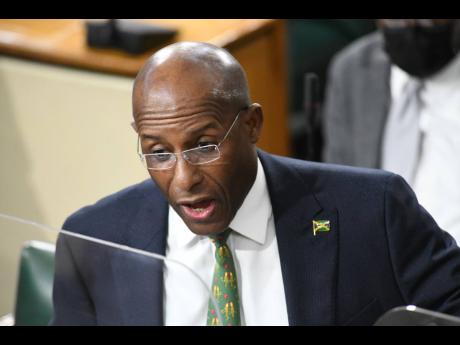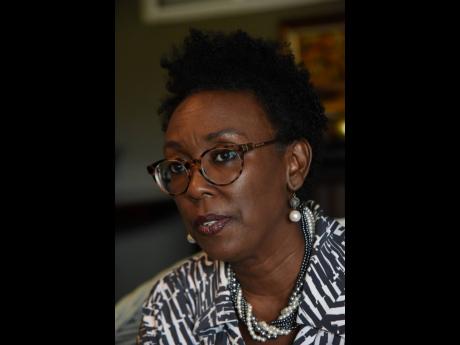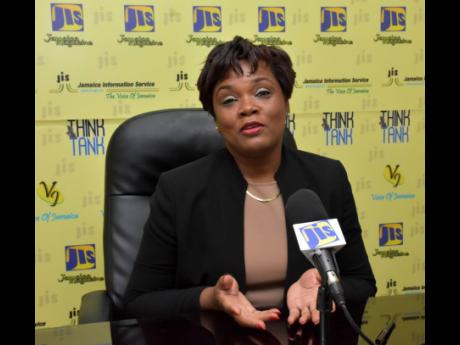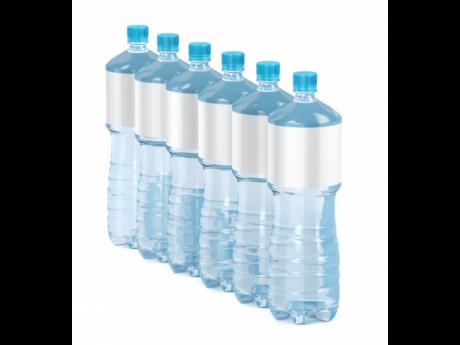Not hiding
• Hill promises to publicly address controversies plaguing industry ministry • Health ministry highlights concerns with some manufacturers of bottled coconut water and bottled water
Declaring that he is not in hiding, Industry Minister Aubyn Hill said he will “fulsomely” address Jamaicans on a series of controversies plaguing his ministry, including whether he retains confidence in an agency head who released substandard rice linked to a Cabinet minister’s company.
“I’m not hiding. Not going around any bush,” Hill told The Sunday Gleaner, indicating that he is working to update Jamaicans this week on the rice importation saga involving a company owned by Health and Wellness Minister Dr Christopher Tufton; the “urgent action” demanded to deal with substandard building blocks and concerns about some brands of bottled coconut water and bottled water.
All three cases heightened scrutiny of the operations of the National Compliance and Regulatory Authority (NCRA), the government body mandated to protect Jamaicans from substandard products but whose powers are yet to be established in law seven years after it started operations.
“ The Gleaner has raised a lot of important matters,” the minister said, adding that: “I will be going right upfront to face you and your colleagues and say this is what I’ve found; this is what we’re going to do about it.”
Hill took over the industry, investment and commerce ministry in January 2022 from Audley Shaw, who took over in 2018 from Karl Samuda.
“Since I came here,” Hill said, “I’ve been talking about repurposing the agencies because we have to change what we’re doing.”
The minister said several persons are involved in the reviews underway, which explains why he has not made any public pronouncement on the issues, except when his ministry announced a review of the rice importation regime following The Sunday Gleaner story on December 11 last year.
The Jamaica Manufacturers and Exporters Association (JMEA) and anti-corruption lobby Jamaica Accountability Meter Portal (JAMP) have urged the intervention of the ministry in the three major issues that have emerged in recent weeks, especially given their impact on public health and safety.
Hill has been forced into a series of meetings since December when The Sunday Gleaner revealed that the NCRA’s chief executive officer Dr Lorice Edwards-Brown authorised the release of a detained shipment of rice on July 20, 2022, the same date test results confirmed that the products failed to meet government standards.
NOT ACCEPTABLE
Edwards-Brown has not answered questions on why she acted in that manner, a position that’s not acceptable, argued JAMP’s executive director, Jeanette Calder.
The advocate shared that the non-response from both the NCRA head and the ministry lend support to “reasonable” questions being asked on whether a special favour was granted to Blue Zone, whose managing director Charles Tufton said the shipment was released after the “intervention” of Edwards-Brown. Charles is Minister Tufton’s son.
Weeks later, The Sunday Gleaner also brought to light a July 2022 NCRA internal report calling for “urgent attention” after 57 per cent of building blocks sampled from 109 manufacturers drawn from across 12 parishes did not meet the minimum requirement for bearing load. Average compliance for 2022 was 28 per cent.
Edwards-Brown has admitted that Hill was not made aware of the matter, a stance a senior ministry official said was unacceptable given the implications for the safety of the public.
One week ago, there was a revelation that the NCRA has been dragging its feet in supporting an audit of test results which showed that some brands of bottled coconut water and bottled water were failing to meet the minimum standards for consumption.
Concerns were raised by the Bureau of Standards Jamaica (BSJ) from as early as September last year, with questions sent to the NCRA head in October still unanswered.
An audit is now underway of results from August to November 2022, the period during which test results “elicited a cause for concern”.
Internal data suggests that the bottled water and coconut water samples returned a failure rate of between 25 and over 70 per cent for tests conducted over the period.
The NCRA was formerly the regulatory division of the BSJ. The BSJ establishes standards that are monitored and enforced by the NCRA. The bureau also conducts tests for clients, including the regulatory authority.
The two agencies have sent mixed signals on whether it is safe for Jamaicans to consume bottled coconut water and bottled water. The NCRA said it is satisfied the products are safe and healthy, while the BSJ said it prefers to wait on the findings of the audit, the deadline of which is not public.
TWO MAJOR AREAS OF CONCERN
Jamaica’s Ministry of Health and Wellness (MOHW) also does its own monitoring and regulation of bottled coconut water and bottled water, using the public health departments and inspectors under the Public Health Food Handling Regulations.
“The MOHW is confident that adequate food safety safeguards are in place regarding the testing and enforcement of bottled water and coconut water,” said a ministry statement of its own internal systems.
But it has two major areas of concern which involve uncertified and illegally operating manufacturers; and the addition of substances to the products which alter the quality.
The health ministry explained that the possibility exists that poor processing techniques may result in food-borne illnesses, hence increasing the burden of care on health facilities.
It also said some new or unrecognised brands may illegitimately utilise the labels of a certified or popular brand to sell their product.
“In addition, the natural characteristics of the product may be altered by infusing additives or diluting the product and not indicating the constituents on the label,” the health ministry added.
Actions taken by the Ministry of Health and Wellness against bottled coconut water and bottled water manufacturers over the last two years:
• Removal/recall from the consumer trade: As a result of routine sampling done at entities that are in operation and from the shelves of retail outlets, products that were tested and found to be unsafe were removed/recalled.
• Closure: Entities were closed for non-compliance with the MOHW Food Handling Regulations. Bottled water entities that harvested and treated water from natural springs were temporarily closed due to unsatisfactory raw water quality based on laboratory results.
• Enforcement Notices: Some operators were served with enforcement notices to be implemented in a specified time, or risk closure due to:
- food service breaches, including lack of food handling permits by employees
- temperature abuse that resulted in spoilage of refrigerated products





